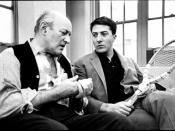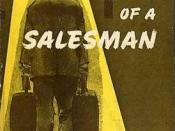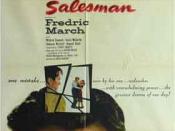"Death of a Salesman" and "All My Sons" are centered around one man trying to attain the American dream. Few will deny that Americans are keenly focused on the quest for money. The American Dream is the belief that through hard work, courage, and willpower one could attain a better life for oneself and family, more often than not through financial wealth. The difficult part is, once attained, the methods and knowledge need to be passed from one generation to the next to assure this dream is maintained. To add to this difficulty, neither son finds their father's knowledge or career inspiring.
One of the main differences between "Death of a Salesman" (DOS) and "All My Sons" (AMS) is that the father Joe Keller in AMS has already achieved the financial wealth portion of this American Dream while father Willy Loman in DOS has not. One of the major similarities of these plays is both fathers killed themselves to allow their sons to attain and maintain wealth and prosperity.
Willy Loman is a short fused 60 year-old salesman who through his struggle for the American Dream finds himself struggling to carry on in the aggressive consumerist world. Through his struggle to attain this dream, he finds himself visiting the past in his mind and tries to sculpt his sons into his own image of success. By doing so, he tries to prevent his sons from following down his same path of failure in attaining the American Dream. However, this comes with a price: He is trying to drown his sorrows by sniffing gas because he feels responsible for the failure of his son Biff. This is a secret that his wife Linda and son Happy only know. This secret, if not revealed could mean the end of his life.
Joe Keller is a 61 year-old man who owns a machine shop. Joe has become a wealthy man; however, his wealth comes with a large price: He was responsible for the death of twenty-one pilots by manufacturing faulty engine parts and selling them to the military. In addition, he made his partner take the fall and get sent to prison while he was working on becoming wealthy for his son Chris. His wife Kate is the only one who has knowledge of this secret; a secret that if not revealed could mean the end of his life.
A key struggle that Willy Loman faces is within him. A salesman's success is based on clientèle and unfortunately Willy Loman is washed-up and can't even make it to his destination to sell his products. He explains that he's worn-out and couldn't make it on his trip. He also explains that he only got as far as Yonkers, and doesn't remember the entire details of his trip. After thirty-five long years as a traveling salesman all through New England, Willy Loman is drained and defeated by his lack of achievement and his complicated family life.
Similarly, a key struggle that Joe Keller faces is also within himself. To conceal a lie about being responsible for the death of twenty-one men and have a suspicion that you've been figured out must weigh on the mind. Becoming aware of people staring and talking in a whispered hush would make one feel paranoid. Combine this with the knowledge that your son killed himself because he was ashamed of what you have done and you have a classic cocktail of suicidal tendencies.
Willy Loman has two sons named Biff and Happy who idolized their father when they were young. Happy has learned nothing from his father's failure but insists that his father had "the only dream you can have is to come out the number one man". Although younger, Happy has become more successful than Biff. Biff has jumped from job to job following high school but has never settled down. He is confused and feels he has wasted his life.
Joe Keller has one son that is living and one son that has died. He lost his second son Larry in "World War II" and has given up everything including his honor for his remaining son Chris. Joe is a man who adores his family above everything else, and is excited to see his son Chris become married. His son Chris is going to ask for Larry's former fiancée Ann's hand in marriage.
Because Willy has no hopes of achieving the American Dream himself, he tries to transfer his hopes to Biff but he doesn't want to become what Willy has.
Biff realizes that his father had the wrong dream and didn't know who he was anymore. Biffs dream is to own a ranch out west where he can live close to nature and raise cattle.
There is one way for Chris in AMS to become free and able to live his own life, one way for him to get his fathers company and fortune without interference from the government. This becomes a reality in the final scene of AMS. First, Joe claims that he has done everything for his son Chris.
"You're a boy, what could I do! I'm in business, a man is in business; a hundred and twenty cracked, you're out of business; you got a process, the process don't work you're out of business. I never thought they'd install them. Chris⦠Chris, I did it for you, it was a chance I took it for you. I'm sixty-one years old you don't get another chance, do ya?" (AMS 69, 70)Finally, Joe simply gives up and tells Chris that he is going to tell the truth and go to prison for his crime. He goes into the house to get his coat and a gunshot of freedom is heard just a few minutes later.
There is one way for Biff in DOS to become free and able to live his own life. This becomes a reality in the final scene of DOS. Biff confronts Willy about sniffing gas. Willy denies it and tries to go outside to hang himself. Biff pulls him back:"No, no, nobody is hanging himself Willy. I ran down 11 flights today, and suddenly I stopped and in the middle of that office building and I saw the sky. I saw the things that I love in this world: the work and the food and the time to sit and smoke. Why am I trying to be what I don't want to be? What am I doing in an office making a contemptuous fool of myself when all I want is out there waiting for me the minute I say I know who I am! Now why can't I say that? Dad, will you let me go? Will you take that phony dream and burn it before something happens?"Willy becomes so proud of Biff crying to him and says that he is going to be great and successful one day. Willy coincides with his dead brother and decides that it will be a magnificent thing for Biff to have his twenty thousand dollar life insurance check so he kills himself.
Willy Loman of "Death of a Salesman" and Joe Keller of "All My Sons" are two fathers that struggled to pass down the knowledge and methods needed to achieve and maintain The American Dream. Both fathers failed at attaining this dream for themselves and in doing so gave the ultimate sacrifice for their sons to meet this dream. The sacrifice that was given for the success of this dream was their lives.
Works CitedMiller, Arthur. All My Sons. New York, New York: Penguin Group, 2000.
Death of a Salesman. Dir. Volker Schlondorff. 1985. VHS. Lorimar Home Video.



Ok
It's an essay to a very specific assignment, so it's usefulness to others is very limited. Nonetheless, it's an essay that includes a proper bibliography, OK grammar, and accomplishes its goal. I'd give it a yellow smiley.
2 out of 2 people found this comment useful.